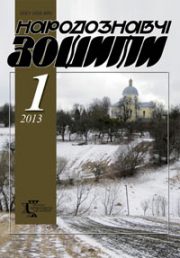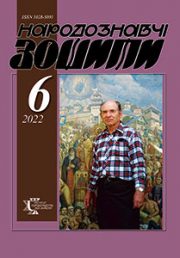The Ethnology Notebooks. 2024. № 4 (178), 810—822
UDK [398.88:27-534.3-853](=161.2)”18/20″:801.81
DOI https://doi.org/10.15407/nz2024.04.810
UKRAINIAN FOLKLORE PRAYS: TERM, CONTENT OF THE CONCEPT, GENRE ECLECTICISM
HUNCHYK Ihor
- ORCID ID: https//orcid.org/0009-0008-6448-5461
- Ph.D. of Sciences in Philology, Associate Professor,
- Ivan Franko National University of Lviv,
- the Department of Ukrainian Folklore Studies named after Academician Filaret Kolessa,
- 1, Universytetska street, 79000, Lviv, Ukraine,
- Contacts: e-mail: hunchyki@gmail.com
Abstract. The article is the first attempt to outline the scope of the use and semantic content of the term «folk prayer» and related concepts. This is the relevance of the study. To this end, the author analyzed the most important works of researchers on this topic and relevant folklore and ethnographic material from different regions of Ukraine in the nineteenth and early twenty-first centuries, which gave grounds to assert that the concept of «folk prayer» was used not only in the scientific field but also in the folk terminological tradition to denote folklore texts correlated with incantations, spells, sayings, curses, and other typologically related formations.
The purpose of the proposed article is to consider folk prayer in contemporary scientific discourse as a separate original ethno-cultural phenomenon that belongs to the occasional ritual or magical-sacred folklore and has a Christianized religious basis. The term «folk prayer» was first used in the early twentieth century by V. Miloradovych in one of his ethnographic works on the life of the peasants of Lubny. At the end of the nineteenth century, Ivan Franko published a genre-specific folklore text in the Ethnographic Collection of the National Science School, calling it «a prayer for the mornings of God». The author points to the pan-Slavic context of the spread of folk prayer as an ancient ethno-cultural phenomenon, the existence of which is characteristic of Polish and Czech oral national traditions, which have not yet been sufficiently studied.
To realize this goal, the article uses general scientific and linguistic research methods: historiographic, comparative, descriptive, and typological.
Keywords: folk prayer, folklore, conceptual field, oral tradition, term, Slavs.
Received 25.07.2024
REFERENCES
- (1973). Dictionary of the Ukrainian language: in 11 vol. (Vol. 4: I-K). Kyiv [in Ukrainian].
- Zhaivoronok, V.V. (2006). Signs of Ukrainian ethnoculture: dictionary-reference. Kyiv: Dovira [in Ukrainian].
- Hrushevskyi, M. (1993). History of Ukrainian literature: in 6 vols., 9 books (Vol. 1). Kyiv: Lybid [in Ukrainian].
- Petrov, V. (1947). Ukrainian folklore (conspiracies, wails, ritual folklore of the folk-calendar cycle). Munich (On manuscript rights) [in Ukrainian].
- Rosovetskyi, S.K. (2008). Ukrainian folklore in theoretical coverage. Kyiv: KU [in Ukrainian].
- Brzozowska-Krajka, Anna. (1995). Between magic and religion: about folk prayers. Folklore —sacred — religion: collective work (Pp. 183—200). Lublin: UMCS [in Polish].
- Kowalski, Piotr. (2004). Prayer and silence. An introduction to the anthropology of silence. Literatura ludowa, 4—5 (48), 3–17 [in Polish].
- Zowczak, Magdalena. (1994). Mythology of incantation and mysticism of ordering according to modern materials of the Vilnius region. Literatura Ludowa, 4—6 (38), 5—36 [in Polish].
- Zowczak, Magdalena. (1998). Folk prayer. Polska Sztuka Ludowa — Konteksty, 1, 33—42 [in Polish].
- Velmezova, Jekatierina. (2013). Folk prayers and orders in Czech folklore: analysis of the text in the context of the history of Russian ethnolinguistics and folkloristics. Skavia Helvetica (Vol. 83, pp. 285—303). Bern [in Russian].
- Potebnya, O. (1877). Little Russian folk song according to the list of the 16th century. Voronezh [in Ukrainian].
- Yefimenko, P. (1874). Collection of Ukrainian spells. Moscow [in Ukrainian].
- Chubynskyi, P.P. (1872—1878). Proceedings of the ethnographic and statistical expedition to the Western Russian region, organized by the Imperial Russian Geographical Society. South-Western department. Materials and research: in 7 vol. Sankt-Peterburg [in Russian].
- Myloradovych, V.P. (1904). The Life and Being of a Lubensk Peasant. Kyiv antiquity, 5 [in Ukrainian].
- Andrievsky, O. (1930). Bibliography of literature from Ukrainian folklore (Vol. 1). Kyiv: All-Ukrainian Acad. Sciences [in Ukrainian].
- Holovatskyi, Y. (1991). Presentations of ancient Slavic legends or mythology. Kyiv: Dovira [in Ukrainian].
- Novitskyi, J. (1913). Little Russian folk incantations, spells, prayers and recipes, collected in Ekaterinoslavshchyna (Pp. 4–42). Ekaterinoslav [in Ukrainian].
- Kolessa, Filaret. (1938). Ukrainian oral literature. Lviv [in Ukrainian].
- Wozniak, M. (1935). Two «old world fathers» from the time of Shashkevich. Notes of NTSH (Vol. 135, pp. 184—185). Lviv [in Ukrainian].
- Lastivka, K. (2008). Rakhmasky Easter: collection. Chernivtsi: Zelena Bukovyna [in Ukrainian].
- Franko, I. (1898). Hutsul proverbs. Etnohrafichnyj zbirnyk (Vol. 5, pp. 41—72). Lviv [in Ukrainian].
- Mytropolyt, Ilarion. (1991). Pre-Christian beliefs of the Ukrainian people: hist.-relig. monogr. Kyiv: Oberegy [in Ukrainian].
- Hrytsai, M.S., Boyko, V.G., & Dunaevska, L.F. (1983). Ukrainian folk poetic creativity. Kyiv: Higher School [in Ukrainian].
- Sukhobrus, G.S. (1965). Ordering Ukrainian folk poetic creativity (Pp. 92–96). Kyiv: Soviet School [in Ukrainian].
- Vasylenko, M., & Shevchuk, T. (1992). Vy, zori-zorytsi… Ukrainian folk magical poetry (Incantation). Kyiv: Molod’ [in Ukrainian].
- Moskalenko, M., & Novikova, M. (1993). Ukrainian incantation. Kyiv: Dnipro [in Ukrainian].
- Antoniuk, V. (1994). Incantation in the language and intonation system of Ukrainian folk poetry and everyday usage. The thesis for the academic degree of Doctor of Philology Sciences with a specialization in Folkloristics. Taras Shevchenko National University of [in Ukrainian].
- Pavlov, O. (1999). Incantation as verbal magic. The thesis for the academic degree of Doctor of Philology Sciences with a specialization in Folkloristics. Taras Shevchenko National University of [in Ukrainian].
- Labashchuk, O. (2004). Ukrainian proverb: structure, everyday life, functions. Ternopil: Textbooks and manuals [in Ukrainian].
- Kharitonova, V.I. (1992). Prescriptive and incantatory poetry of the Eastern Slavs: Synopsis of lectures. Lviv: LSU [in Ukrainian].
- Dmytrenko, M. (2007). Charms of folk speech (Pp. 3—6). Kyiv [in Ukrainian].
- Chornopysky, Mykhailo. (2008). Ukrainian folkloristics: dictionary-reference. Ternopil: Textbooks and manuals [in Ukrainian].
- Kotula, Franciszek. (1976). Signs of the past: keep traces of the past in your memory. Warszawa: LSW [in Polish].
- Antofijchuk, V. (1996). «Prayer, like the eternal sun…». Genre of prayer in Ukrainian literature. «Holy senses embedded in prayer…»: Anthology of Ukrainian prayer: in two books (Book 1, рр. 3—9). Chernivtsi: Ruta [in Ukrainian].
- Kovaliv, Yu. (2007). Literary encyclopedia: in 2 vol. (Vol. 2, pp. 67—68). Kyiv: Akademiya [in Ukrainian].
- (2001). Lexicon of general and comparative literature. Chernivtsi: Golden Drums [in Ukrainian].





